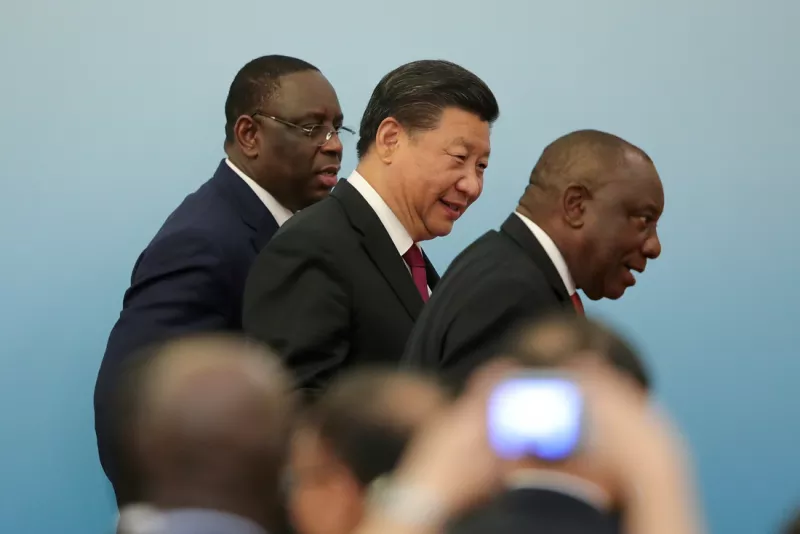In the news yesterday it was reported that Chinese nationals are burrowing in Nigeria’s mines, grabbing whatever deposits of Lithium they could find to sneak back home to fuel their industries. Given that the metal is pricey in the international market and that it is a valuable ingredient in the production of batteries that run the next generation of electric products including electric cars, government must stop the Chinese before it is too late.
Miners under the umbrella of the Miners Association of Nigeria had sent a passionate plea to government to check the activities of Chinese miners “scavenging” for Lithium, saying that their activities will threaten the economy down the line.
They asserted that:
“Chinese are moving from one mining site to the other, scavenging and mopping our raw lithium mineral at a cheap rate to develop their industries and economy.
“This is not good for the future of our economy; what this means is that Nigeria will end up buying electric batteries from them.
”Allowing the Chinese to enter into every mining site is one of the reasons kidnapping is on the increase in Nigeria because they are the major target for kidnappers.”
They ended their plea by asking the government to:
Revoke the 100% mining licence granted the Chinese.
Allowing the Chinese have 100% mining assets is not good enough for the indigenous mining investors.
Safeguard our lithium and revive all the moribund companies producing batteries in Nigeria to start using the lithium to produce electric batteries.
Market for Lithium
A look at the market for Lithium obviates the concern and demands of the miners:
Fortune Business Insights puts the value of the global lithium market at $3.83 billion in 2021 and it is projected to double to USD 6.62 billion in 2028 at a CAGR of 8.1% in the period. This is more than the more familiar metal, Silver which Grand View Research valued at USD 182.1 billion in 2019 and is expected to grow at a compound annual growth rate (CAGR) of 9.0% in terms of revenue from 2020 to 2027.
Uses of Lithium
Beyond the value of the precious metal in the raw state, unravelling the value chain can confer billions of dollars to any economy that has the metal encrusted in its earth. Indeed, according to Live Science Lithium is a versatile metal that is used in medicine and in the making of batteries. Lithium is “the lightest known metal can also lighten your mood. Lithium, atomic number 3, is an element of many uses. It’s used in the manufacture of aircraft and in certain batteries. It’s also used in mental health: Lithium carbonate is a common treatment of bipolar disorder, helping to stabilize wild mood swings caused by the illness”.
Lithium-ion batteries are used in mobile phones, computers, electronics, energy storage systems and electric vehicles. The forecast is that they will dominate the lithium market over the next decades.
Breaking down only a fraction of the value chain reveals significant gains for the economy; the electric car market is valued at USD 246.70 billion in 2020. The market is forecast to rise from USD 287.36 billion in 2021 to USD 1.318.22 trillion by 2028 at a CAGR of 24.3% during the forecast period 2021-2028.
If Nigeria was to tap into just 1% of that market as per the projection above, it means electric cars can add more than $13 billion to the economy in one year and $91 billion in seven years. Imagine the tons of jobs such a value addition will create! Nigeria’s Teslas would only be on the horizon. It is a matter of political will.
This goes without saying that similar numbers can be added if the same approach is applied in the medical and aeronautical fields that require Lithium inputs. The dollar trove such an initiative can build can only be imagined. This will also have implications for buoying the country’s forex reserves.
What FG must do
Seeing that exploiting Lithium has the potential to add to the economy especially when value addition is done, the government should move swiftly to end the total control of these mines and indeed mines for other minerals across the nation. Licenses for exploitation should come with conditions attached; the condition of processing these raw metals into by-products here in Nigeria and the export of these products fully controlled by local regulators.
The government knows as much; it was in the news that the minister of Mines and Steel Development, Olamilekan Adegbite, while speaking at a summit titled, “Leveraging Future Minerals for Sustainable Development”, said a Tesla representative approached him at a summit in Saudi Arabia and showed interest in getting Lithium from Nigeria but he rejected the bid and asked Tesla to set up battery industry in Nigeria.
Once such attention is given to value addition which means the setting up of industries, jobs will be created for Nigerians and once these products are exported, forex is earned for the country. Once this is achieved across the board for all the precious metals in Nigeria including Uranium, gold, Bitumen, Columbite, and hundreds more, Nigeria would be on its way to significantly reducing the 33% unemployment of the economy. The time to start is now.




